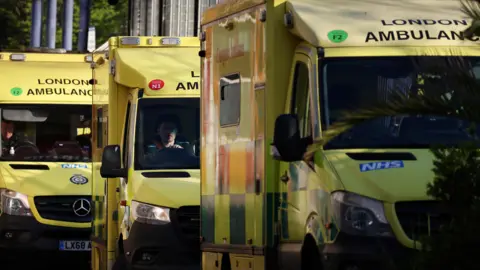Sickle cell patients not listened to - report
 Andy Rain
Andy RainPeople with sick cell disease have actively avoided seeking ambulance care because of past negative experiences, according to a report.
Some patients described a lack of appropriate pain relief, inconsistent care, having to answer too many questions while in acute pain, and not feeling listened to or respected.
The findings were part of a research project commissioned by London Ambulance Service (LAS) NHS Trust and carried out by the Sickle Cell Society.
LAS said it had developed an action plan to improve care for patients with sickle cell disease, including more detailed training for all front-line clinicians and improving the use of pain relief.
Poor care 'indefensible'
Other themes arising included insufficient priority and slow attendance, not being taken to a preferred hospital and issues with handover from LAS to emergency departments.
A joint written submission from four individuals (one sickle cell patient, two parents of young adults with sickle cell, and one widow of a sickle cell patient), who had also sought the views of peers, stated: "There is a general consensus that the majority of people spoken to are very reluctant to call the ambulance service unless it is the only and last resort and the pain is so bad they have no excuse but to go hospital.
"This is for numerous reasons: fear of not receiving appropriate pain medication en route, not being listened to in terms of what their needs are and perception of being seen as a drug-seeking individual."
They added that sickle cell patients' views of LAS were often "marred by past performance".
The report's recommendations include the LAS routinely involving sickle cell patients in training for its staff and ensuring that staff have a basic understanding of the sickle cell disorder.
Dr Fenella Wrigley, chief medical officer at the ambulance service, said: "While we have made improvements, I fully recognise that we need to continue to support the needs of patients with sickle cell disorder and ensure that they feel listened to.
"Our emergency call-handlers and ambulance crews are frequently the first contact with the NHS for patients experiencing a sickle cell crisis and it's vital that we can advocate for them.
"We are committed to delivering outstanding urgent and emergency care for everyone who lives in our city. In a modern ambulance service this means delivering more personalised care for our patients, including sickle cell patients."
John James, chief executive of the Sickle Cell Society, said: "This report is crystal clear in its framing of the huge challenges faced by sickle cell patients in London, when they are at their most vulnerable.
"It is indefensible that people with a serious and life-threatening health condition are receiving poor care, delays and unhelpful attitudes from ambulance staff.
"We welcome LAS commissioning this report, and their commitment to the development of an action plan to address its recommendations. It is essential that this leads to real, lasting change."
There are about 17,500 people with sickle cell disease in the UK.
It is particularly common in people with an African or Caribbean family background.
Symptoms can include very severe pain, serious and life-threatening infections and anaemia.
Listen to the best of BBC Radio London on Sounds and follow BBC London on Facebook, X and Instagram. Send your story ideas to [email protected]
